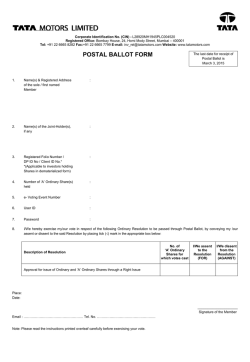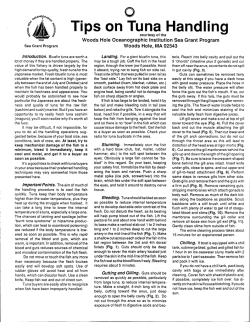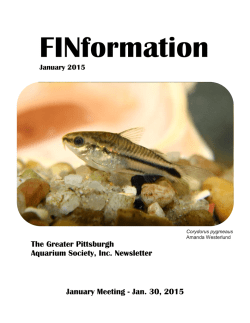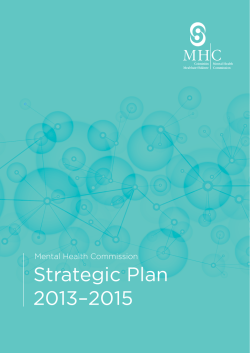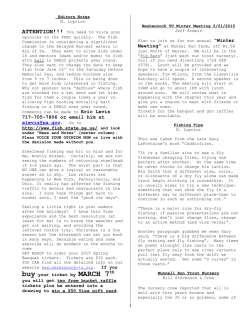
here - The World Aquaculture Society
WORLD AQUACULTURE SOCIETY Election 2015 Membership ID# This is the ballot for election of Officers and Directors positions in the World Aquaculture Society. Informative responses and photographs of candidates approved by the Board of Directors are presented below. The Board has approved fully electronic voting for all members with working e-mail addresses. A PDF version of the ballot will be on the web site and can be downloaded, filled out and mailed (see instructions below). Members without e-mail addresses will be mailed a paper ballot Please read the following instructions carefully: One (1) vote for Officer positions: -President-Elect is elected for a one-year term. -Treasurer is elected for a two-year term. Two (2) votes for Director. -Two Directors will be chosen to serve a three-year term. Ballots must be received in the Home Office by March 20, 2015 either by mail, fax or email. Ballots received after this date will NOT be counted. To prevent multiple voting, only ballots with correct identification numbers will be counted. Please enter your WAS ID number into the box at the top of this ballot. Your ID number is on the outside envelope label. When ballots are received at the Home Office the identification number will be checked against a list of numbers (no member names) in order to ensure an anonymous vote and to eliminate repeat voting. Any other identification of the sender (by fax or email) will be removed from the ballot message. The ballot may be returned by: Airmail to WAS Elections Committee 2013-2014, WAS Home Office, 143 J.M. Parker Coliseum, LSU, Baton Rouge, LA 70803 (USA), Fax to +1-225-578-3493, or Email to [email protected] or online voting at www.was.org/ballot PRESIDENT-ELECT (Select One) Juan Pablo Lazo Marco Saroglia Juan Pablo Lazo What is your vision for WAS? I see WAS as becoming the leading, high-profile and most important aquaculture society in the world, committed to promoting the development of sustainable aquaculture across the 5 continents by assisting in the exchange of the latest scientific and technological information between the academic, private, government and non-profit sectors. WAS must also further develop its capacity for identifying the challenges faced by the aquaculture industry, and providing solutions in a timely, efficient and scientifically sound manner. I also envision WAS as a leading promoter of best-practice guidelines for the aquaculture industry, a key component of sustainable development. How would you contribute to furthering the objectives of WAS? I believe that through adequate leadership and collaboration the society can significantly contribute to the sustainable development and integration of the aquaculture industry across the world. The quality of services provided to our members must be improved to focus more specifically on their particular needs closely coupled with our quickly changing trends and to increase global representation within the society of underrepresented groups particularly from Africa, Latin America and some Asian regions. I would also like to make WAS more visible and recognized in the global aquaculture community and to increase our member involvement with our affiliates and vice-versa. Social media play a crucial role in the exchange of information and WAS must embrace technological venues as a means of communication and will be given a high priority if elected. I would like to enhance student involvement in WAS activities by developing opportunities for participation in leadership positions and conference organization, as well as strengthening the Student Activity Committee within each chapter and exploring the creation of a global network of student members. There is an urgent need to improve the quality of JWAS. New strategies need to be put in place to attract the submission of higher quality papers. I would establish a special Task Force to conduct a thorough analysis of the journal’s strengths and weaknesses, clearly identify its target audience, review its current production process and propose specific strategies to the board to increase its scientific quality, relevance and profile. What experience do you have that will help you in the office for which you have offered to stand? I have been a member of the society since the early 90’s and have been involved in organizing several international symposiums on Aquaculture Nutrition as well as other WAS sponsored meetings. I served as the President of the Latin American and Caribbean Chapter of WAS from 2009 to 2011, and my role focused on encouraging greater integration between research, educational institutions and businesses and promoting aquaculture development within the chapter. I then served on the board from 2011 to 2014 as a Director. As Chair of the Affiliations Committee, I focused on promoting and enhancing alliances with aquaculture organizations through the world. I have therefore gained extensive experience within WAS and would like the opportunity to further contribute to its goals. Marco Saroglia What is your vision for WAS? WAS is an association of stakeholders in aquaculture issues, scientists, farmers and technology producers, having among its duties any action as contacts facilitation, communication and divulgation that may allow the growth of the world fish production. How would you contribute to furthering the objectives of WAS? Supporting the WAS Commissions, Journal of the World Aquaculture Society, World Aquaculture Magazine, congressual and trade show activities; promoting actions in conjunction with affiliate societies; facilitating any actions to increase the number of affiliates in all the continents including areas where aquaculture is not strongly developed yet; promoting the culture and public perception of aquaculture fish production in the World; promoting a financiary sustainable conduction of the Society; promoting the ethics of quality, environmental and resources susatinability and animal welfare in fish farming; promoting among stakeholders and asssociates the awarness of the aquaculture role in feeding humanity at 7 billion level and even more at 9 billions level. What experience do you have that will help you in the office for which you have offered to stand? About 40 years of research activity in aquaculture and contact with the productive farms in R&D projects, with more than 300 publications, congress communications, books and books editing. 30 years teaching Aquaculture in Universities in undergraduated, postgraduated and PhD courses. Experiences in organizing scientific conferences within EAS and WAS, as local, European and World size (Verona Aquaculture conference and trade show; EAS conferences; WAS congresses as Florence 2006, Prague 2012); 8 years services within the EAS Board of Directors; 3 years service as WAS Director; activity within WAS's Commissions. TREASURER (Select One) Reg Blaylock Wendy Sealey Reg Blaylock What is your vision for WAS? I understand the significant and growing role aquaculture will play in the future and believe WAS should embrace its responsibility in promoting progressive and sustainable aquaculture because it gives us the opportunity to proactively guide the process. Long-time members understand that WAS provides excellent opportunities within the aquaculture community for exchange of information through national and regional meetings and publications, but WAS has not fully engaged the crop of potential partners at the various levels of commerce, academia, government, and the public. WAS should pursue better integration of these constituent groups to maximize the information exchange that will spur the advances in aquaculture science, technology, and education required for innovatively managing the development of progressive and sustainable aquaculture. Even in a challenging budgetary environment, targeted investments into the system of travel grants and awards would encourage broader participation in the Society and its meetings, particularly at the entry level. To maximize the value of the investment, WAS should recruit sponsors for these awards from outside organizations and businesses to share the cost because both WAS and the organizations will benefit from partnerships that advance common goals. Although these arrangements typically are thought of as student-oriented, these should be developed across all constituent groups to diversify and grow the society. WAS should further seek to increase the interchange among constituent groups by working to establish a system of formal continuing education that would entice more professionals to attend and contribute to the meetings and promote WAS as a recognized venue for professional development. Although some initial investment may be required, such courses would ultimately be self-supporting. However, it is important to create a graduated cost system to encourage participation, particularly at the entry level. WAS also should explore the possibilities of joint meetings with related professional societies to facilitate greater commingling among professionals. How would you contribute to furthering the objectives of WAS? I would work to secure WAS’s current success and value to its members while engaging partners to seek innovative ways to leverage WAS’s current success into a thriving future as he has done in USAS. What experience do you have that will help you in the office for which you have offered to stand? I am the Assistant Director of the Thad Cochran Marine Aquaculture Center at the University of Southern Mississippi. I have been a member of WAS since 1999. In addition to presenting papers and organizing and moderating sessions, he has served as Chair of the Steering Committee for Aquaculture America 2011, Director on the USAS (a chapter of WAS) Board, and member of the USAS Promotion and Membership Committee. Since 2011, I have served as Secretary-Treasurer and Chair of the Finance Committee for USAS. During my tenure as USAS Secretary-Treasurer, USAS instituted a financial plan aimed at providing for secure short-term operation of the Society while investing a portion of the Society’s assets in a longer-term strategy designed to build capital to secure future priorities. USAS has maintained a sound financial footing while significantly increasing its support of students and awards. The administration has been successful at negotiating financial commitments from businesses for joint sponsorship of several major awards that benefit USAS members. Wendy Sealey What is your vision for WAS? My vision is for the WAS to become the preeminent aquaculture network that is inclusive of the diversity that defines aquaculture stakeholders throughout the World. How would you contribute to furthering the objectives of WAS? To accomplish this vision, the World Aquaculture Society must be bold and nimble enough to enter into nontraditional partnerships to implement the Society’s foundational concepts of leadership, education and development in underrepresented aquaculture areas. To further this objective, I would work cooperatively with current Board members and industry leaders to identify existing aquaculture community actions and initiatives in under-represented areas and develop student and professional development opportunities for existing members. Through in-partnering with these initiatives, I believe we can leverage limited funding to improve the visibility, recognition and outreach of WAS in the global community without reducing existing member services and compromising membership value. What experience do you have that will help you in the office for which you have offered to stand? Dr. Wendy Sealey is a fish physiologist at the Bozeman Fish Technology Center in Bozeman, Montana, USA. In this role, Wendy is responsible for the oversight and project coordination of a collaborative research program leveraging funds and engaging various federal and state governments, as well as domestic and international academic and aquaculture industry partners on projects to address high-priority aquaculture research needs. Wendy obtained her B.S in Animal Science from Auburn University, her M.S. in Pathobiology from the Auburn University College of Veterinary Medicine and her Ph.D. in Nutrition from Texas A&M University. Prior to working at the Fish Technology Center, Wendy worked as an Extension Associate for the North Central Regional Aquaculture Center, as a Biomedical Research Fellow at the University of Arkansas for Medical Sciences, and a Research Professor at the University of Idaho at the Hagerman Fish Culture Experiment Station. BOARD OF DIRECTORS (Select Two of Four) Kathleen Hartman Darryl Jory Jose Polanco Patricia Valenti Kathleen Hartman What is your vision for WAS? My vision for WAS is to strengthen the Society’s commitment to excellence in aquaculture through science, technology, education and information exchange by expanding opportunities to enhance the value and relevancy of WAS to global aquaculture communities, related aquaculture industries as well as to Society membership. I strongly believe that by investing in the WAS membership, through educational programs, workshops, student support and publications, the Society grows even stronger in the promotion of advancing sustainable aquaculture worldwide. I want WAS members to say more than that they just joined WAS to receive the conference registration discount. I want WAS members to get the discount, but also to feel connected and dedicated to the WAS mission and vision and realize the significance of this Society to world aquaculture. How would you contribute to furthering the objectives of WAS? I am committed to helping WAS and its chapter societies achieve their goals, set new goals and develop strategic plans for advancing the mission of the Society and meeting the needs of the membership. I feel strongly about developing and promoting educational opportunities, relevancy for industry and support for students. I have really learned from and enjoyed my experience as USAS President and hope to take the next step and actively contribute to the larger Society. What experience do you have that will help you in the office for which you have offered to stand? I am a current member of the World Aquaculture Society (WAS) and have been a member of WAS for nearly 20 years; first, as a student member and now as President of the U.S. Aquaculture Society (USAS). I have also served on several other volunteer committees and boards and know how challenging it can be to make time and energy for these efforts. But I really enjoy it! I also write a column for Aquaculture Magazine called “Health Highlights”. The promotion and security of aquaculture is both a professional and personal interest of mine. Being President of the U.S. Chapter has been a wonderful experience and I am eager to continue my active involvement with WAS. I am the Aquaculture Program Leader for USDA APHIS Veterinary Services stationed in Ruskin, FL at the University of Florida, Tropical Aquaculture Laboratory. I received my Masters from the University of Maryland (studying fish nutrition) and both my DVM and Ph.D. (studying oxytetracycline metabolism in fish) from Virginia Tech. I have a courtesy Assistant Professor appointment at the University of Florida, in the Program of Fisheries and Aquatic Sciences. I have served two consecutive terms on both the AVMA’s Food Safety Advisory Committee and Aquatic Veterinary Medicine Committee. I currently serve on the Professional Standards Committee of the American Fisheries Society-Fish Health Section and have been a certified AFS FHS Aquatic Animal Health Inspector since 2008. Darryl Jory What is your vision for WAS? I would like to support the World Aquaculture Society’s vision for sustainable and responsible development of global aquaculture by focusing on information dissemination and serving a significant role in bringing together academia, students and the business and commercial side of aquaculture. In particular, I would like to be involved in developing strategic alliances with aquaculture and ancillary industries worldwide, including producers’ organizations and others, and assist in expanding and increasing the recognition and visibility of WAS and its growing role in responsible global development of sustainable aquaculture business models. How would you contribute to furthering the objectives of WAS? I would like to serve on event organizing and program committees and sessions to leverage my relevant experience and extensive global professional network. I have been directly involved in the organization and management of several major scientific and trade events, congresses, meetings and workshops worldwide, including the U.S., Panama, Venezuela, Colombia, Peru, Brazil, Chile, Mexico, Nicaragua, Honduras, Singapore, Indonesia, Vietnam, Thailand, China, France, Spain and others. I have presented many papers, including keynote and invited. I would also like to bring my experience as editor to strongly support the WAS Publications Committee, to assist in growing and further improving the Journal of the World Aquaculture Society and the World Aquaculture magazine, and to assist in editing book manuscripts. As Editor and Development Manager of the Global Aquaculture Alliance (GAA, an international, non-profit trade association promoting environmentally and socially responsible aquaculture). I have been the editor of its official publication, the Global Aquaculture Advocate magazine, since 1999, am involved in organizing the annual GOAL meetings and have also developed a significant network of producers’ associations and stakeholders worldwide. As an Assistant Editor for WAS (1995-2005) and a shrimp columnist and tilapia co-columnist for Aquaculture Magazine (1994-2006). As a manuscript reviewer for several industry and refereed journals for many years. What experience do you have that will help you in the office for which you have offered to stand? I am an aquatic biologist and businessman with over 30 years of experience in aquaculture business development, production management and support, R&D and academics. As an experienced aquaculture researcher, commercial aquaculture facility developer and manager, I have been an owner and director of various aquaculture and aquafeed companies in various countries since 1990, and have developed broad industry experience and perspectives regarding global aquaculture development in many countries in four continents, as well as an extensive global industry network. My education includes B.S., M.S. and Ph.D. degrees in Marine Biology and Aquatic Resources from the University of Miami (Coral Gables, FL USA), and an Executive M.B.A. degree in International Business & Operations Management from Nova Southeastern University (Fort Lauderdale, FL USA). I was also a Fulbright Scholar Postdoctoral Fellow at the University of Oriente, Margarita Island, Venezuela. Other relevant experience includes: Senior Scientist, Pentair Aquatic Ecosystems, Apopka FL USA. Adjunct Professor of Aquaculture. University of Miami, FL USA. 1988-present. Participation in >175 aquaculture meetings & workshops in several countries since 1982. Over 100 papers, articles, books, book chapters and monographs published Memberships: American Registry of Professional Animal Scientists (ARPAS); Sigma Xi, Scientific Research Society; World Aquaculture Society (including U.S., Latin and Asian Chapters). Jose Polanco What is your vision for WAS? From my personal experience, WAS has been an organization where I have had the privilege of making good friends which also enriched my knowledge and experience on worldwide aquaculture allowing better understand many different issues from a multidisciplinary perspective. This is of immense value for a researcher and practitioner, even more when they have come along with very special moments of pleasure and joy. WAS is the perfect organization for networking and create ways of cooperation across the various stakeholders involved in aquaculture all around the world. No other association provides the coverage in the various regions and disciplines involved in aquaculture. Dissemination of knowledge, networking and practical feedback are, from my point of view the most important benefits WAS offers to the development of aquaculture. And all of these are being well covered with the publications and conferences. There is always chance for improvement, and I would like to contribute on it. How would you contribute to furthering the objectives of WAS? In the last four years I have been involved as program chair in three different WAS conferences (APA 2011, AQUA 2012 & WA 2014). I am well trained in the many organizational tasks required for the success of a conference including promotion and recruitment. I may also contribute in strengthen and activities with other organizations involved in the fields of fisheries and aquaculture resulting in synergies for all partners, promoting affiliation and participation in WAS activities and efforts for improving public knowledge and perceptions of aquaculture. What experience do you have that will help you in the office for which you have offered to stand? Besides the experience in the WAS conference referred above, I am almost 20 years of research and lecture experience in the field of aquaculture economics, marketing and social issues with a wide experience in the field all over the world. In the last five years I am participating as individual expert in several official working groups and projects related to aquaculture economics, policy and governance of the European Commission and FAO, along with other commitments with private and governmental institutions. I have coordinated international research and operational projects, which provided me with skills also in administrative duties. Patricia Valenti What is your vision for WAS? WAS is an International Society with the aim of including researchers, technicians, Governmental Agencies, Governmental and Non-Governmental Organizations, and all professionals who work in the area of aquaculture. WAS should play an important role in spreading science-based and business information and technology on aquaculture around the world to contribute to the global expansion of aquaculture. How would you contribute to furthering the objectives of WAS? I have been involved in aquaculture for 16 years and have worked in teaching, research, extension and the development of national and international private and public institutional policies. Thus I believe I have a significant ability to promote WAS and to continue to contribute to WAS meetings, publications, etc. I am very keen to be involved actively in the work of the WAS Board and to contribute to several committees (e.g. Affiliations, Student Affairs). In my vision, WAS should include all stakeholders of the aquaculture production chain. I would like to recruit professionals from different professional areas to be WAS members; I think that they can involve themselves in the subject of aquaculture and contribute to our industry with their varied experience. Through my experience of WAS, especially my involvement in the LACC, I feel that I know very well how the WAS Board works; therefore I think I could adapt very quickly to being a member of the Board if the membership has sufficient confidence in me to elect me. What experience do you have that will help you in the office for which you have offered to stand? I have worked in the Crustacean Section, Aquaculture Center - CAUNESP at Sao Paulo State University, Brazil for 15 years as a PhD. Student, Post-Doctorate and Professor, developing research and extension services in aquaculture. I graduated as a biologist in 1998 and as a fisheries specialist in 1999. I gained my MSc and PhD in Aquaculture in 2002 and 2005, respectively. I have worked for two years in the Brazilian Amazonia, transferring aquaculture technology to the rural population. In 1999, I joined CAUNESP to initiate a large project on the development of the technology for farming the Amazon River prawn Macrobrachium amazonicum. I served the GTCAD – [Working Group on Freshwater Prawn Farming (Brazil)] as Secretary (2000-2004) and as Coordinator (2004-2006); during this time, I organized workshops and headed a survey of the freshwater prawn production in Brazil. Since 2011, I served the WAS Latin American & Caribbean Chapter [LACC] as Secretary for two years and as a Director for the past year. I am also an Executive Committee Member of the NGO Aquaculture without Frontiers [AwF]. I was previously a Professor in the Coastal Campus of Sao Paulo State University, Brazil for two years and currently I am a Professor in the University of Santo Amaro [UNISA] and at the Aquaculture Center of UNESP-CAUNESP, where I work in research and teach in the undergraduate and graduate programs in aquaculture (Bachelor, Master and PhD). I have organized and chaired many sessions in WAS meetings since 2003 and joined the panel of referees for abstracts, posters and oral presentations. In WAS 2011, I was a member of the Local Organizing Committee and responsible for short-courses during WAS 2011, in addition to chairing sessions.
© Copyright 2026
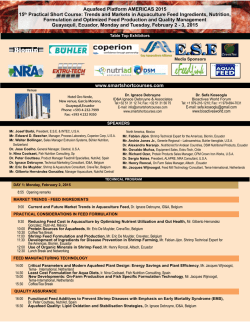
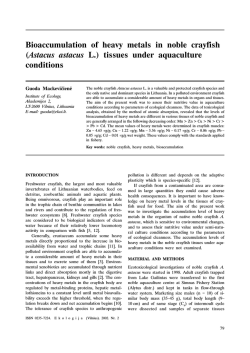
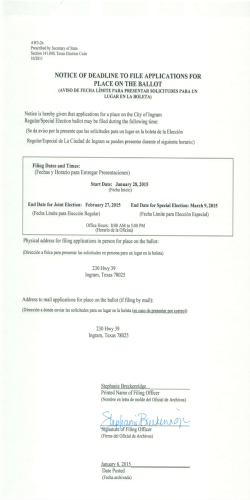
![[ 1 ] NOTE: LAST DATE OF RECEIPT OF POSTAL BALLOT](http://s2.esdocs.com/store/data/000489684_1-7e4047aa8dd7d7193789d756c5e00460-250x500.png)
